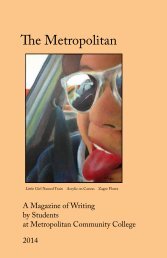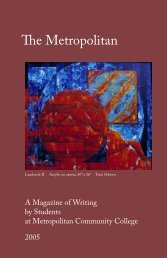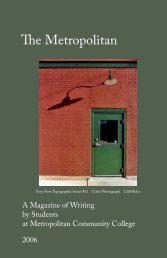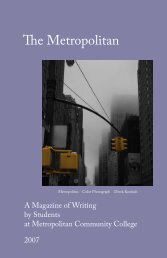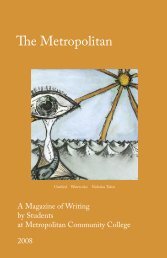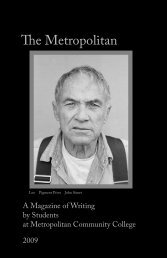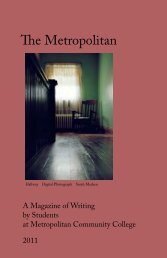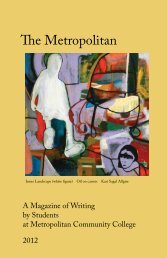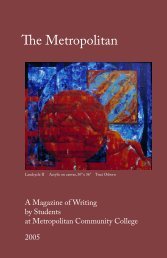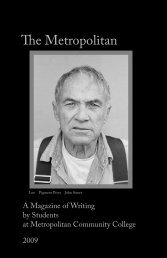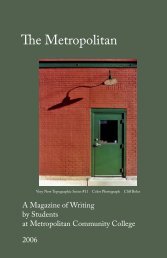The Metropolitan 2008 Issue
Create successful ePaper yourself
Turn your PDF publications into a flip-book with our unique Google optimized e-Paper software.
<strong>The</strong> <strong>Metropolitan</strong><br />
Untitled Watercolor<br />
Nicholas Tabor<br />
A Magazine of Writing<br />
by Students<br />
at <strong>Metropolitan</strong> Community College<br />
<strong>2008</strong>
<strong>The</strong> <strong>Metropolitan</strong><br />
A Magazine of Writing<br />
by Students<br />
at <strong>Metropolitan</strong> Community College<br />
<strong>2008</strong><br />
“Literature is news that stays news.”<br />
Ezra Pound
<strong>The</strong> <strong>Metropolitan</strong> <strong>2008</strong><br />
Editors:<br />
Cindy Catherwood<br />
Charlie Cogar<br />
Paul Dickey<br />
Lorraine Duggin<br />
Susan Ely<br />
Erin Joy<br />
Technical Advisors: Jamie Bridgham, Rebecca Orsini, Buffi Union<br />
Editorial Assistant: Jane Smith<br />
<strong>The</strong> <strong>Metropolitan</strong> publishes all types of academic and literary writing, including<br />
descriptive, narrative, expository, and persuasive works, as well as creative<br />
prose and poetry. We encourage writings from across the disciplines and also<br />
welcome visual art. Our goal is to showcase the best of the many voices, styles,<br />
and subjects Metro writers and readers find meaningful and to support critical<br />
thinking, creativity, and expression at <strong>Metropolitan</strong> Community College.<br />
<strong>The</strong> <strong>Metropolitan</strong> is published once a year. <strong>The</strong> print edition includes<br />
the best selections from the full web edition which can be read at<br />
http://commhum.mccneb.edu/metropolitan<br />
Inquiries to metropolitan@mccneb.edu or to<br />
<strong>The</strong> <strong>Metropolitan</strong> c/o Cindy Catherwood<br />
South Omaha Campus<br />
<strong>Metropolitan</strong> Community College<br />
P.O. Box 3777<br />
Omaha, Nebraska 68103-0777<br />
Printed in Omaha, Nebraska by Barnhart Press<br />
©<strong>2008</strong><br />
Christine Lafinhan<br />
Steve Lovett<br />
Jasmine Maharisi<br />
Brett Mertins<br />
Lindsey Pruitt<br />
Katie Stahlnecker<br />
Contents<br />
<strong>2008</strong> Writing Awards 4<br />
Steven Balters<br />
<strong>The</strong> Anticyclone 5<br />
Break in the Binge 6<br />
Patricia Sedlacek<br />
<strong>The</strong> Race 7<br />
Amber Johnson<br />
<strong>The</strong> Sandbox 13<br />
Sarah Gregory<br />
Guinness 17<br />
Zedeka Poindexter<br />
<strong>The</strong> Cost of Obsession 18<br />
Katria Wyslotsky<br />
An Inconvenient Suicide 22<br />
Glen Ross<br />
In Our Backyard 28<br />
Chelsea Balzer<br />
Your Coat 32
<strong>The</strong> Anticyclone<br />
Steven Balters<br />
<strong>2008</strong> Writing Awards<br />
For his poem “<strong>The</strong> Anticyclone,” Steven Balters is the<br />
winner of <strong>The</strong> <strong>Metropolitan</strong> <strong>2008</strong> Prize for Student Writing, a<br />
12-credit-hour tuition remission. <strong>The</strong> first runner-up, Patricia<br />
Sedlacek is awarded 9 credit hours tuition remission for her essay<br />
“<strong>The</strong> Race.” <strong>The</strong> second runner-up, Amber Johnson, receives 4.5<br />
credit hours tuition remission for her essay “<strong>The</strong> Sandbox.”<br />
How long will you wait<br />
For the train to come in,<br />
Straining to hear the whistle<br />
Somewhere over the hill,<br />
When you know that it’s bound<br />
For an entirely different station?<br />
And what would you gain<br />
From its arrival at the platform?<br />
<strong>The</strong> cold-faced conductor<br />
Wouldn’t listen to you anyway,<br />
Those in the dining car<br />
Would only laugh and sip their wine,<br />
And the indifferent engineer<br />
Wouldn’t invite you on board.<br />
You appear more alone than you really are<br />
At that Siberian railway stop,<br />
Letting the wind press on your shoulders<br />
And thinking of your favorite fairy tale:<br />
Two people understanding each other.<br />
<strong>The</strong> <strong>Metropolitan</strong> 5
Break in the Binge<br />
Steven Balters<br />
A spring storm rolled steadily outside,<br />
<strong>The</strong> rain falling hard,<br />
<strong>The</strong> bird bath overflowing.<br />
You drank Keemun until you were sick<br />
With your cousin still ill,<br />
Your uncle, downstairs, alone with the lightning,<br />
Your mother, somewhere in the depths of the house,<br />
And you selecting more tea, counting the thunder,<br />
And watching the bird bath overflow.<br />
<strong>The</strong> Race<br />
Patricia Sedlacek<br />
As Kel stepped out of the ranch house door, she was<br />
greeted by another crystal clear, perfect June, mountain morning<br />
in South Lake Tahoe. Another day in paradise, she thought to<br />
herself while adjusting her new Ray-Bans that had cost her<br />
nearly a week’s salary.<br />
She made her way down to the barn to start the daily ritual<br />
of saddling horses for the hordes of tourists who would be rolling<br />
into the dusty parking lot within the hour. After stumbling<br />
through the excited pack of dogs that rushed to greet her, she<br />
stopped to brush the dust from her designer jeans. Hearing a<br />
familiar rumble, Kel turned to see her brother Mike pulling into<br />
the parking lot. He was driving his old, rust-infected Chevy and<br />
pulling his primer-grey, homemade horse trailer. Her younger<br />
brother was prone to disappear for days, especially over the<br />
weekends when the barn was the busiest.<br />
“Where’ve ya been, Mikey?” Kel asked as she applied<br />
another coat of lip gloss.<br />
“Carson,” he replied with a wink, disengaging himself from<br />
his dilapidated rig.<br />
“What ya got in the trailer?” she asked.<br />
“Oh, you’ll like this one. I bought him from this old guy<br />
that I met at Sharky’s Bar last night,” Mike said and spit tobacco<br />
juice, nearly hitting her red snakeskin boots.<br />
Kel walked with Mike to the back of the trailer and helped<br />
him drop the loading door. Her brother backed the big bay horse<br />
down the ramp. After getting a good look at her little brother’s<br />
new horse, Kel thought to herself, Unless he got him for free, he<br />
paid too much. <strong>The</strong> poor thing looked as if he had missed many<br />
meals, and she could count his ribs from six feet away. His feet<br />
had been neglected for many months; they were overgrown,<br />
chipped, and broken in several places. His head hung low, and his<br />
eyes were dull and listless, like old pennies in a forgotten jar.<br />
“Only gave two-fifty for him,” Mike said with a sly grin, as<br />
he wiped the caked mud from the bay’s face with his worn and<br />
frayed shirt sleeve. “<strong>The</strong> old guy said he bought him off the track<br />
6 <strong>The</strong> <strong>Metropolitan</strong> <strong>The</strong> <strong>Metropolitan</strong> 7
a few years ago and was going to make a jumper out of him. <strong>The</strong>n<br />
he found out he has a bad heart, can’t take too much pressure, but<br />
he’ll make a fine trial horse for some rich yuppie’s kid.”<br />
Kel’s little brother fancied himself to be somewhat of a<br />
world class horse trader, buying cheap and reselling for a profit.<br />
As Kel walked toward the barn shaking her head, she heard Mike<br />
yell after her, “Maybe if you’re real lucky, I’ll let you try him in a<br />
few days.”<br />
It was nearly a week later when she saw the big bay horse<br />
again. It was another one of those perfect June days, clear blue<br />
sky, the scent of pine trees and campfire filling the air. She’d spent<br />
a busy morning renting out horses to one group of tourists after<br />
another and was preparing to go out on what her obsessively<br />
controlling stepmother called “Safety Patrol.” <strong>The</strong>y always offered<br />
to send a guide with every group, but most people preferred to<br />
ride without one. For this reason, there were always one or two<br />
employees riding the trails, making sure all was well with horses<br />
and customers.<br />
Kel was bridling her fancy little sorrel mare, the one with<br />
the flaxen mane and tail that matched her own blonde hair<br />
picture perfectly, when Mike rode up on his new bay horse. <strong>The</strong><br />
horse looked much better; he’d put on some weight, and his<br />
hooves were trimmed and sporting new shoes. She also noticed a<br />
little sparkle in his eyes that hadn’t been there before.<br />
“Hey, Kel, why don’t you take this one? He’s real gentle and<br />
pretty smooth.”<br />
“No thanks, Mikey, I prefer riding my own investments,<br />
and you know how tourists like to take pictures sometimes. I<br />
look better on this horse.”<br />
“Oh come on, you chicken, take this one, or are you afraid<br />
he’ll run off with you?” Mike teased, as he dismounted the bay<br />
and shoved the reins into her hand.<br />
She wanted to say, Why yes, now that you mention it, I am a<br />
bit scared to ride off on some big ugly dink I don’t know, but instead,<br />
“Give him here,” was all she said.<br />
“Excuse me, can you tell us who we need to talk to around<br />
here to rent a couple of good horses?”<br />
Kel and Mike both turned in the direction of the voice and<br />
saw two ladies standing on the other side of the corral fence.<br />
<strong>The</strong>y were dressed almost exactly alike: matching oversized<br />
Harrah’s Casino t-shirts, one in bright blue stretch pants, the<br />
other in fluorescent pink. Each had a bejeweled fanny-pack, the<br />
cheap kind found in all the hotel gift shops, strapped tightly<br />
around their rather excessive, what used-to-be waists. <strong>The</strong>y were<br />
what her brother would call a couple of big eaters.<br />
“I hope you have better horses here than that stable down<br />
the street. We just came from there, and those lazy horses<br />
wouldn’t go. It didn’t matter how hard we kicked them; all they<br />
would do is walk, and we want fast horses,” Pink Pants said.<br />
“We complained to the manager, and he gave us our money<br />
back and told us to come here,” chimed in Blue Pants.<br />
“I’m sure we can fix you up,” Kel said, then turned and<br />
yelled toward the rent barn, “Hey, Katie, take care of these ladies<br />
please.” Without a word, Pink Pants and Blue Pants waddled<br />
toward the sign-up desk at the rent barn. Kel turned back and<br />
looked at her brother, who just rolled his eyes and shook his head<br />
with a smile.<br />
Kel hadn’t realized how tall Mike’s new bay horse really was<br />
until she tried to get on him. Extra-tight Wranglers look good,<br />
but they’re a bad combination with a tall horse. This was one of<br />
the two reasons she preferred short horses, the other being that<br />
it was a shorter distance to the ground for emergency dismount<br />
or unintended ejection. After a short struggle to get on, Kel and<br />
the big bay horse left the corral area and headed out toward the<br />
private riding trails of the ranch.<br />
<strong>The</strong> main trail wound its way through the pines for a short<br />
distance, and then the trees opened up into a large meadow<br />
dissected by the Truckee River. <strong>The</strong> colors of the meadow were<br />
breathtakingly beautiful: the bright greens of the grass, the lacy<br />
purple and yellow wild flowers dappled with a bright burst of<br />
orange from the delicate, California poppy.<br />
Kel followed the main trail to the river crossing and slowly<br />
guided the unfamiliar horse down the concrete-reinforced<br />
embankment, already becoming slick with summer moss. <strong>The</strong><br />
horse moved slowly through the cold water, choosing each step<br />
8 <strong>The</strong> <strong>Metropolitan</strong> <strong>The</strong> <strong>Metropolitan</strong> 9
carefully. She stopped him in the middle where the clear water<br />
was the deepest and sat for a moment watching two rainbow<br />
trout meander past the horse’s dark legs in search of their<br />
noontime meal. After the fish had moved on, she softly urged the<br />
bay forward and up the far side of the concrete embankment. At<br />
this point, the trail split into three different directions. She chose<br />
the trail to her left. It was the most popular with customers.<br />
She urged the bay into a trot and then gently squeezed her<br />
legs, pushing him into a slow lope. Mike was right; he was very<br />
smooth, each foot hitting the ground softly like little pillows. He<br />
was responding to the reins nicely, too. Power steering is always a<br />
welcome surprise.<br />
Kel was really beginning to enjoy her new used Cadillac of<br />
a horse when off to her right she caught a glimpse of fluorescent<br />
pink accompanied by a piercing scream. She pulled hard on the<br />
reins, and the big bay came to a stop. It’s always good to know<br />
the brakes work, too. She quickly looked to her right again and<br />
saw a grey horse with Miss Pink Pants coming down a hill out<br />
of the trees at breakneck speed. <strong>The</strong> rider’s screams sliced sharply<br />
through the peaceful meadow.<br />
“Oh shit!” Kel said out loud, spinning the big bay around<br />
and digging her heels in hard. <strong>The</strong>y were immediately in hot<br />
pursuit.<br />
<strong>The</strong> runaway and his reluctant passenger were heading<br />
directly for the main trail back to the rent barn. Kel knew that<br />
Miss “We want fast horses” Pink Pants could fall off at any time,<br />
but it would probably happen when those metal horseshoes<br />
hit the slick concrete at the river crossing, where both horse<br />
and rider would go down in a bone-crunching heap. She could<br />
see the reins hanging loosely around the gray’s neck, while the<br />
woman had a death grip on the saddle horn with both hands.<br />
This particular strategy was a bit puzzling; it was like driving a<br />
car at seventy miles per hour and holding onto the dashboard<br />
instead of the steering wheel.<br />
Kel had hoped to catch up to them where the two trails<br />
merged into one. Although the bay was in a full gallop, they<br />
hadn’t closed the gap by much. Kel leaned forward as far as she<br />
could, throwing her arms up the sides of his long neck, and dug<br />
her heels in hard once more, hoping to get a little more speed<br />
out of the big bay horse. She had never ridden a thoroughbred<br />
ex-racehorse before and was shocked to realize that she had just<br />
happened upon the nitro-turbo-thruster button. It is that fifth<br />
gear that only thoroughbred racehorses have and, up until that<br />
moment, she never knew for sure existed. For a split second, she<br />
could have sworn they had become airborne. <strong>The</strong> length of the<br />
bay’s stride seemed to double, and his legs were stretching so far<br />
out in front of his chest she couldn’t believe they were his. She<br />
had to grip hard with her legs to keep from becoming unseated<br />
herself. She turned her head slightly to one side, and the great<br />
god of wind speed confiscated her new Ray-Bans right off her<br />
face. Looking ahead once more, she realized they had cut the<br />
distance by half and were still gaining.<br />
<strong>The</strong> landscape flew by in a muted green blur, and after a few<br />
long moments, they were right behind the grey and his hysterical<br />
co-pilot. Seeing the river crossing just ahead, Kel maneuvered the<br />
bay to the side of the grey, and in a few more strides, they were<br />
neck and neck. She took the reins in one hand and reached down<br />
with the other to grab the loose rein of the runaway, pulling him<br />
in closely to the bay and slowing them both down at the same<br />
time. <strong>The</strong>y all came to a sweaty, breathless stop.<br />
Kel quickly jumped off the bay and helped Pink Pants<br />
to the ground. She had stopped screaming but was white as a<br />
sheet and shaking uncontrollably. Kel was feeling like a bowl of<br />
Grandma’s green Jell-O herself.<br />
After a few minutes, Blue Pants rode up and dismounted.<br />
She rushed to her friend and asked her if she was all right. Pink<br />
Pants could only nod her head. <strong>The</strong>n Blue Pants turned to Kel<br />
and screamed sarcastically, “What’s wrong with you people,<br />
renting out crazy animals like that?”<br />
“It wasn’t the horse,” was all Kel could say, as she wiped the<br />
sweat off her own very pale face.<br />
With a forced smile, she kindly asked the two ladies if they<br />
would like to remount, and she would escort them back to the<br />
barn. Not surprisingly, they declined and said they would prefer<br />
to walk.<br />
10 <strong>The</strong> <strong>Metropolitan</strong> <strong>The</strong> <strong>Metropolitan</strong> 11
Kel lingered in the meadow awhile trying to regain her<br />
composure, letting the horses graze on the sweet grass, and<br />
thinking to herself, People just don’t get it. A horse is not a machine,<br />
like a go-cart. She took a long look at her brother’s big bay horse.<br />
God he was ugly, but she knew she would never have caught that<br />
runaway on her own pretty little sorrel horse.<br />
Kel remounted the bay and led the other two horses back<br />
to the barn. <strong>The</strong> two women had apparently gotten into their car<br />
and left without saying a word to anyone or even asking for their<br />
money back. She tied up the rent horses and led the bay toward<br />
the house where her brother was coming out of the door, wiping<br />
mustard from his mouth with his shirttail.<br />
“Well, how did ya like him, Kel?” Mike asked with his<br />
Cheshire Cat grin. “You didn’t ride him too hard, did ya? I forgot<br />
to remind you he had a bad heart.”<br />
“I don’t know how you do it, Mikey, but I’d hang onto this<br />
one for a while if I were you,” she said. “<strong>The</strong> horse might have a<br />
bad heart, but it’s sure a big one.”<br />
<strong>The</strong> Sandbox<br />
Amber Johnson<br />
<strong>The</strong> steam was rising gradually from the ground. It was<br />
about 130 degrees. How could anyone want to live here? It was<br />
like a prison. We were only allowed to leave when they said<br />
we could. I arrived January 10, 2006. I was counting down the<br />
tortuous days until next February and was nearly halfway there.<br />
I had parked myself on an upside-down Desert Storm era, 15-<br />
gallon bucket that had been weathered by sand, wind, and time.<br />
It was almost brown and had a small fracture through the middle<br />
of the bottom. I made up my mind to stay in the shade of the<br />
awning attached to my barracks that consisted of an old, desert<br />
camouflage, medium-sized tan tent that smelled like mold and<br />
felt like worn-out sandpaper. One cot was allowed per soldier,<br />
and like the rest of our equipment, it was aged and sounded<br />
like a rusty vault being unlocked as it was opened. I shared this<br />
tent with three other female soldiers: Private Holland, Private<br />
Calendar, and Private First Class Rodriguez. I liked it, though; it<br />
was just a five-minute walk from the chow hall. I spent a lot of<br />
time there.<br />
As I wondered how everything was going back home,<br />
my first line supervisor walked up to me. Sergeant Griffen was<br />
one of the shortest, sweetest, most soft-spoken people in our<br />
company. She told me that my squad needed to report to the<br />
first sergeant immediately for a mission. I let her know I would<br />
inform the squad to be ready in an hour. My heart sank into my<br />
gut. Without her telling me, I already knew what was going on.<br />
I had been left as squad leader in charge until Staff Sergeant<br />
Winters got back from R&R, which she needed more than any<br />
of us. I still don’t know how someone could work thirty hours in<br />
a twenty-four hour day. I got up from the half-melted pail and<br />
slowly walked inside our tent. Only one out of the three soldiers<br />
was taking a break there. I asked where Private Holland and<br />
Private First Class Rodriguez were. As Private Calendar told me<br />
they had gone to the chow hall, the two of them returned. I told<br />
the group to bag up and report to the first sergeant by 1530, so<br />
they got their weapons and water bags ready.<br />
12 <strong>The</strong> <strong>Metropolitan</strong> <strong>The</strong> <strong>Metropolitan</strong> 13
Ten minutes before 1530 rolled around, the three very<br />
young, new soldiers came walking up to the first sergeant’s office<br />
where I was waiting. Private Holland, a short Hispanic female<br />
with raven hair, was a soldier who went strictly by regulations<br />
and whose job was with army supplies. Private First Class<br />
Rodriguez, who worked with Holland, had a darker complexion;<br />
she was mixed Scots and Black and had a very calm and relaxed<br />
attitude. Private Calendar walked a few steps ahead of them, one<br />
of her boot strings hanging out. “Let’s roll, yo,” she said, tripping<br />
over the untucked string. I asked her if she was nervous. “Never,”<br />
she informed me, fixing her boot. I knew what they were feeling.<br />
I felt it, too, the first time I went on a mission outside the wire.<br />
You’re scared, not knowing who’s out there and what they might<br />
try to do to you.<br />
In the office, First Sergeant Toney briefed us about a<br />
casualty pickup detail. He told us who we needed to see, how<br />
we were going to get there, and when we could come back.<br />
I explained that Staff Sergeant Winters was on leave, and I<br />
couldn’t afford to lose any of my team. He told me, “You’re all<br />
I got, kid.” I walked out of the first sergeant’s office and had<br />
everyone collect extra ammo. I won’t ever forget those soldiers’<br />
faces as long as I live. <strong>The</strong>y had the look of death in their eyes. I<br />
was scared for them, and I knew that if anybody made one wrong<br />
move, it would jeopardize the mission along with our lives.<br />
We headed to the motor pool where all the vehicles for<br />
our unit were kept. I signed out a humvee, brand new with all<br />
the perks; it had doors and air conditioning. We would be riding<br />
in style, I told my troops. I tried to lighten the mood, which<br />
seemed to help at least a little. In this business, we try to find<br />
every single silver lining we can, no matter how small. I prayed<br />
we left alive and came back the same way. We passed the front<br />
checkpoint on our way out. <strong>The</strong> guards saluted us and we saluted<br />
back, wondering if this would be the last time we would raise our<br />
hands to brow in honor.<br />
<strong>The</strong> casualty pickup was only ten miles away but seemed<br />
an endless drive. Ten miles is the distance most folks drive to<br />
work. Thinking about an everyday trip can help squelch the fear.<br />
No one had spoken a word since we left. Twenty minutes went<br />
by and we were driving along at 10 miles an hour, the fastest we<br />
wanted to go to keep away from roadside bombs or IEDs. I hate<br />
IEDs. <strong>The</strong>y’re hard to spot most of the time. It’s amazing to me<br />
how a Coke can or an old cell phone can be made into a small,<br />
efficient bomb. Forty minutes went past. I couldn’t believe it. We<br />
were almost there, and no conflict or explosions. It’s almost eerie<br />
going through this ocean of sand, the waves of grainy sediment<br />
still and quiet. Its scent was like that of a beach. We were driving<br />
in a boundless sandbox. Private Calendar joked about building<br />
sand castles when she got back.<br />
Just like that, we were at the pickup site and ready to<br />
work. <strong>The</strong> station looked like a glorified cardboard box made of<br />
plywood and was the size of four semi-trucks attached to each<br />
other. We reported to the sergeant in charge and were divided<br />
into teams. I was paired with Calendar, and Rodriguez was<br />
paired with Holland. We split up and headed to the casualty<br />
station. <strong>The</strong> first guy we picked up was a U.S. soldier. Like all the<br />
fatalities there, he had been at the wrong place at the wrong time.<br />
I felt sorry for him even though there didn’t appear to be any<br />
physical damage to him. I took his large, lifeless, blue hands, and<br />
Calendar took his feet. We headed towards our humvee, about<br />
ten feet away from the pickup site.<br />
This guy seemed to be getting lighter as we went along,<br />
and I couldn’t understand why. He was still in his uniform with<br />
the best pair of combat boots money could buy. He wore a tancolored<br />
shirt with two pairs of dog tags, one around his neck<br />
and one shoved into his boot. Luckily, he still had the rest of his<br />
body or they would have shoved a pair of those silver dog tags<br />
in between his teeth or up the roof of his mouth to identify him.<br />
He was a non-denominational Christian who had an allergy<br />
to bee stings. He was a former drill sergeant, according to the<br />
badge on his pocket. His name was Ed Gribsby. Ed looked real<br />
sharp. His face was serene. Calendar start to whimper. I looked<br />
up at Calender who told me the man was slipping from her<br />
grip. “This guy is pretty light,” I told her, and then I saw the<br />
crimson, gelatinous, slime on her hands. I looked under Ed’s limp<br />
motionless body and saw a trail that would be fit for any shark if<br />
we had been in water. I realized his increasing weightlessness was<br />
14 <strong>The</strong> <strong>Metropolitan</strong> <strong>The</strong> <strong>Metropolitan</strong> 15
due to the massive, gaping hole left in what used to be his back.<br />
It looked like fresh hamburger and smelled like sour water from<br />
a vase of old flowers, mixed with cottage cheese and an outhouse<br />
that had never been emptied. We got him onto the humvee, and<br />
Calendar began to cry and regurgitate all that food she ate at the<br />
chow hall. “I didn’t know we had spaghetti today,” I told her in<br />
some vile attempt to calm her down. I let her have a few minutes<br />
to gather herself. We still had a mission to do. Finally, ten bodies<br />
later, we saw Holland and Rodriguez walking out to us. We all<br />
climbed into the humvee and rode a little bit faster than before.<br />
Nobody said anything. All we heard was the wind and the wheels<br />
crushing sand underneath us.<br />
We were saluted by the guards on our way back into the<br />
front checkpoint we had left a few hours before. <strong>The</strong> sun was<br />
beginning to set behind the Afghan mountains, creating a swirl<br />
of purple clouds and dim-orange sky. It was cooler then, enough<br />
to wear a jacket. More than anything, we were thankful to be<br />
alive, seeing firsthand what war can do. We parked the humvee<br />
at the casualty drop-off location where all of the soldiers were<br />
identified and prepared to be flown back home. Everyone<br />
reported back to the first sergeant’s office, where we were<br />
debriefed and given the next day off. Everybody walked back<br />
to the tent, showered, and slumped into their cots. <strong>The</strong> soldier’s<br />
faces were blank and expressionless. I could have told them<br />
everything would be all right or tried to console them in some<br />
way. I thought it would be better to let things quiet down in their<br />
minds. We all lay silent. No one slept that night.<br />
Guinness<br />
Sarah Gregory<br />
Standing on the bar<br />
So tall and<br />
Proud,<br />
A black concoction which<br />
Looks like melted licorice<br />
And whistles from<br />
<strong>The</strong> tap.<br />
I detest your<br />
Arrogance to be poured<br />
So uniquely<br />
Into a glass with an<br />
Advertisement on it,<br />
Your seduction to grown men<br />
Who stagger in a haze<br />
And fall in ditches.<br />
16 <strong>The</strong> <strong>Metropolitan</strong> <strong>The</strong> <strong>Metropolitan</strong> 17
<strong>The</strong> Cost of Obsession<br />
Zedeka Poindexter<br />
“An Act of Vengeance” by Isabel Allende hinges on a brutal<br />
attack on the body and home of Dulce Rosa Orellano by guerilla<br />
Tadeo Céspedes. <strong>The</strong> steps taken by both to change their lives<br />
and public perception after this event were initially successful,<br />
but did not have the intended effect. Separately, Dulce Rosa<br />
and Tadeo built existences that made it impossible for them<br />
to be whole, functional beings when their paths crossed again.<br />
<strong>The</strong> main characters in Allende’s story are ultimately undone by<br />
the contradiction between their public facades and their private<br />
obsessions.<br />
Dulce Rosa is presented to the reader as a plain canvas—an<br />
average girl who was revered for her family’s fortune and her<br />
ability to dance and play the piano. <strong>The</strong> combination of her nonaesthetic<br />
assets and money transformed her into a woman who<br />
had a reputation far greater than she could have earned if she<br />
were truly lovely. Her malleable image also made it substantially<br />
easier for her to manipulate public opinion as she became older.<br />
After the attack by Tadeo, the townspeople assumed she<br />
was fine. It was not that it did not occur to them that there could<br />
or even should be a problem, but the text suggests they bought<br />
into the image that Dulce Rosa worked to project:<br />
Many people asked themselves how it was possible<br />
that the girl had not ended up in a straight jacket<br />
in a sanitarium or as a novitiate with the Carmelite<br />
nuns. Nevertheless, since there were frequent parties<br />
at the Orellano villa, with the passage of time people<br />
stopped talking about the tragedy and erased the<br />
murdered senator from their memories. (Allende 39)<br />
<strong>The</strong> townspeople believed exactly what Dulce Rosa wanted<br />
them to. When she was a young woman, they projected grace<br />
and beauty onto her. Perhaps this is how she learned to present<br />
the appearance of sanity to her peers instead of the revenge that<br />
fueled her.<br />
During this time, Tadeo also changed his public image,<br />
although in a very different way. <strong>The</strong> story never describes him<br />
as a blank vessel for others’ opinions. Tadeo is described as a man<br />
who was exactly what he wanted to be. He was a man of war<br />
and sought fights when there were none to be had. Tadeo made<br />
specific choices to use money and power available to him to<br />
transform himself in others’ eyes:<br />
Peace, the exercise of government, and the use of<br />
power turned him into a settled, hard-working man.<br />
With the passage of time people began to call him<br />
Don Tadeo. He bought a ranch on the other side<br />
of the mountains, devoted himself to administering<br />
justice, and ended up as mayor. (Allende 40)<br />
After his image changed, Tadeo still heard tales of Dulce<br />
Rosa. Each retelling refueled his obsession with the woman<br />
he had attacked many years before. Tadeo had become a man<br />
referred to with great respect, but internally he was not free of<br />
the evils he committed. This connection went well beyond guilt.<br />
<strong>The</strong> text suggests the girl he raped had become his standard for<br />
beauty. He saw her image in all other women he came across.<br />
Eventually, the recurrence of this sight drove him to return to the<br />
place where he had left her bloodied.<br />
Neither character was surprised by their second meeting.<br />
Tadeo knew exactly how to return to the last place he had seen<br />
his victim. He recognized the landscape of the property he<br />
had destroyed and the features of the woman who still lived<br />
there. <strong>The</strong>re was no shock when Dulce Rosa saw him. Her<br />
only response was to say, “You’ve finally come, Tadeo Céspedes”<br />
(Allende 40).<br />
Both had spent thirty years preparing for the time their<br />
paths crossed. Dulce Rosa ran her property and the products<br />
it produced instead of crumbling or searching for a man to do<br />
it for her. She threw parties and took control of her image as a<br />
single, independent woman. Tadeo had become a respected land<br />
owner. Instead of being associated with violence, he had status<br />
in his new community. Perhaps she was stronger and perhaps<br />
he was more legitimate. Both could be true, but they had spent<br />
every day reliving their first meeting. <strong>The</strong>se characters were tied<br />
to each other by an act of violence and their individual attempts<br />
to build lives around that moment instead of beyond it. Tadeo<br />
18 <strong>The</strong> <strong>Metropolitan</strong> <strong>The</strong> <strong>Metropolitan</strong> 19
was obsessed with the image of a bloody child. Dulce Rosa built<br />
a new image so she could avenge the child he never stopped<br />
imagining.<br />
It is possible that both truly changed in the three decades<br />
between their meetings, but it is more possible that they simply<br />
built paths back toward each other, each becoming a conduit of<br />
emotion projected at the other. <strong>The</strong> love they professed seems<br />
plausible only because they spent so long concentrating emotions<br />
on each other. It would have been impossible for them to be<br />
separate entities. Each character’s obsession for the other was an<br />
integral part of what they had become beneath the layer of public<br />
respectability that they had built. This is proven in Dulce Rosa’s<br />
thoughts when Tadeo presents himself to her again: “She went<br />
over her perfect plan of vengeance, but did not feel the expected<br />
happiness; instead she felt its opposite, a profound melancholy”<br />
(Allende 41). To complete the plan she would have to destroy the<br />
fuel for her existence, her self-proclaimed “only mission on earth”<br />
(Allende 39).<br />
<strong>The</strong>se characters’ choices of how to interact with each other<br />
were limited by the lives they lived between their first and second<br />
meetings. How could Tadeo not be happy? He was arm’s length<br />
from the object of his desire. Although Dulce Rosa accepted<br />
Tadeo’s proposal, she had arranged her life so that her primary<br />
options were to honor either love or revenge. <strong>The</strong> third option<br />
devised to release her from the choice was as much a part of the<br />
image she built as the love she felt. Her suicide is a direct result<br />
of a lifetime of building her world around what she would do<br />
when Tadeo came to her again. Dulce Rosa “knew that she could<br />
not carry out the vengeance she had planned because she loved<br />
the killer, but she was also unable to quiet the Senator’s ghost”<br />
(Allende 41).<br />
Dulce Rosa’s last documented thought was of the<br />
limitations of her options. Tadeo’s last thought was of guilt<br />
and penance. Both of these characters were able to successfully<br />
manipulate public opinion. It showed in each explanation of how<br />
they evolved after the rape. What brought this story to the tragic<br />
ending was the fact neither modified their internal motivations.<br />
If Don Tadeo had not been forced by his obsession to return,<br />
Dulce Rosa would not have been faced with choosing between<br />
love, honor and her eventual suicide. If Dulce Rosa had released<br />
herself from her quest for vengeance, she would have had<br />
additional and less extreme options at her disposal if Tadeo had<br />
reintroduced himself into her life.<br />
<strong>The</strong>re is power in controlling what the world assumes.<br />
Learning how to project an image can give people opportunities<br />
they would not have access to otherwise. <strong>The</strong> reinvention of<br />
Dulce Rosa and “Don” Tadeo in the eyes of those around them<br />
proves this. Each character’s reinvention also proves that change<br />
is more than just public opinion. <strong>The</strong> death of Dulce Rosa and<br />
despair of Tadeo are direct results of their internal conflicts. <strong>The</strong><br />
internal workings of a public figure need to be just as healthy<br />
as the face the person shows the world. If these two sides of<br />
a person are not congruent, then they open themselves up for<br />
disaster when faced with their own demons.<br />
Works Cited<br />
Allende, Isabel. “An Act of Vengeance.” Literature and Its Writers.<br />
4th ed. Eds. Ann Charters and Samuel Charters. Boston:<br />
Bedford/St. Martin’s, 2007. 37-42.<br />
20 <strong>The</strong> <strong>Metropolitan</strong> <strong>The</strong> <strong>Metropolitan</strong> 21
An Inconvenient Suicide<br />
Katria Wyslotsky<br />
After a lengthy and thorough review of his life, Frank Finck<br />
concluded that everyone whom he had attempted to emulate,<br />
everyone whom he had at one point or another respected, or<br />
anyone who had a talent that he envied had killed himself or<br />
herself. It couldn’t have been purely coincidental, for how could<br />
anyone have so many heroes commit suicide in the relatively<br />
short amount of time they’d been on the earth? Was this some<br />
sort of subliminal message sent from the great beyond? Was this<br />
just the nature of the life of an artist? And, why had he been<br />
saddled with the unfortunate last name of Finck? Life, it seemed,<br />
was an endless mystery.<br />
Punk rocker Sid Vicious, Saturday Night Live comedian<br />
Chris Farley, and songwriter Elliot Smith overdosed on various<br />
legal and illegal pharmaceuticals. Kurt Cobain stared down the<br />
barrel of a gun seconds before he pulled the trigger and the back<br />
of his head splattered against the wall. <strong>The</strong> pattern his viscera left<br />
behind was reminiscent of a Jackson Pollock painting. Michael<br />
Hutchens appeared to have everything except a healthy sex life.<br />
INXS, the name of his band, seemed to predict his future, for it<br />
was officially reported that he accidentally hung himself while<br />
legally intoxicated and attempting to achieve personal sexual<br />
gratification. No doubt, his wife didn’t appreciate that particular<br />
item of information being printed on his death certificate.<br />
It definitely wasn’t a memento she wanted to keep for her<br />
grandchildren.<br />
Having reached the end of her desire to live, one chilly<br />
February morning poet Sylvia Plath fed her children, hung some<br />
laundry outdoors on the clothes line to dry, and then stuck her<br />
head in the oven without bothering with the pilot light and<br />
inhaled deeply. Maybe she forgot that the turkey was supposed to<br />
go in first.<br />
Donny Hathaway, soul music balladeer, sang a duet with<br />
Roberta Flack at Carnegie Hall, checked himself into the Essex<br />
House, and jumped out of the window of his room on the<br />
fifteenth floor. He was later hosed off the asphalt. <strong>The</strong> month of<br />
August in the city could be brutal.<br />
Actor, screenwriter, and playwright Spaulding Gray, while<br />
commuting between Manhattan boroughs, completed the New<br />
York Times crossword puzzle, neatly folded his overcoat, laid it<br />
on a bench on top of the puzzle, and stepped off of the Staten<br />
Island Ferry into the muck and mire that is the Hudson Bay. If<br />
he hadn’t drowned, then the diseases he would have picked up in<br />
the water would have killed him. It was a mystery as to how far<br />
his body had floated out into the ocean before a fishing trawler<br />
scooped him out of the briny water. Ironic, too.<br />
And finally, even Englishman Lawrence Oates, the intrepid<br />
Antarctic explorer who had survived subzero temperatures,<br />
polar bear attacks, the walrus mating season, and frostbite,<br />
disappointed Frank by throwing back the flap of his tent and<br />
calmly announcing to the shivering members of his expedition<br />
to the South Pole, “I am just going outside and may be awhile.”<br />
With a stiff upper lip, he walked directly into a blizzard of<br />
massive proportion, never to return. It took days for his body to<br />
defrost so that it could finally be laid in a coffin.<br />
So it came to pass early one morning that Frank found<br />
himself giving serious consideration to ending his own life. Why?<br />
Who’s to say? It might have been destiny. It might have been<br />
that he was chronically depressed. It might have been the copious<br />
amount of tequila he’d imbibed the night before. It might have<br />
been a lot of things, none of which truly made any sense. Suicide,<br />
it seemed, was the key to eternal happiness, the end to the<br />
aggravating utility bills which made him slightly hysterical each<br />
month, an answer to some unknown question of the meaning<br />
of life, and an interesting way to pass an otherwise dull Monday<br />
night. However, being the meticulous planner that he was, Frank<br />
needed to carefully examine his various options for suicide,<br />
and he took certain measures to make certain that he was not<br />
distracted in any way while he conducted the necessary research<br />
into his ultimate demise. He disconnected the phone to prevent<br />
being disturbed by its seemingly incessant ringing and closed the<br />
curtains on all the windows so that the early morning sun was<br />
blocked. He prepared snacks to maintain his strength during the<br />
22 <strong>The</strong> <strong>Metropolitan</strong> <strong>The</strong> <strong>Metropolitan</strong> 23
course of his endeavor. <strong>The</strong>n, Frank spent an entire day carefully<br />
listing and weighing the merits of various options for suicide. He<br />
did this in neat columns on the monitor of his computer using<br />
Excel software. After all, he was an Internal Revenue Service<br />
officer, and all government employees have a proud and proven<br />
reputation for being efficient and highly organized. No one could<br />
say that Frank didn’t follow the rules.<br />
Overdosing on chemicals was his first option. Yes, to<br />
sleep, perchance to dream. That was the question. However,<br />
as is proven on his high school and college transcripts, Frank<br />
was never proficient in chemistry or biology and feared dosing<br />
himself incorrectly. <strong>The</strong> slightest miscalculation could mean<br />
the difference between death and copious and, quite possibly,<br />
projectile vomiting, and Frank had major sanitation issues that<br />
had yet to be addressed with his therapist. Basically, he had an<br />
overwhelming aversion to vomiting and would, at all costs, avoid<br />
it whenever and wherever possible. <strong>The</strong>refore, a planned overdose<br />
was shelved before it was given any serious consideration.<br />
Vomiting was anathema.<br />
A gunshot to the head. Quick. Painless... unless you missed.<br />
That’s when things could get messy. Plus, there was the entire<br />
aspect of purchasing the gun, waiting while a background check<br />
was done, learning how to use the weapon, and then purchasing<br />
the requisite ammunition. It seemed to be such a lot of work<br />
for one good shot. Expensive, too. Also, there was the problem<br />
of someone being put to the task of scraping his gray matter off<br />
the walls that needed to be considered if he was successful and<br />
his aim was true. Once again, the old albatross called “sanitation<br />
issues” reared its ugly head. He’d recently had his apartment<br />
painted a lovely and delicate shade of robin’s egg blue only after<br />
having spent days meticulously spackling every pinhole, every<br />
dent, and every tiny hairline crack on the walls. Also, one had to<br />
consider one’s appearance while laid out in a coffin. Appearances<br />
were of primary importance to Frank. A first impression is a<br />
lasting impression. What if one of his friends brought a date to<br />
his funeral? Gruesome, yes. However, one could not find fault<br />
with his friends since sympathy sex was the motivating factor. A<br />
man in mourning required the attention of a good woman and an<br />
outlet for his grief. Anyway, it wouldn’t do to be buried wearing<br />
a football helmet with a chin strap to hold it in place because he<br />
had blasted his skull into tiny little shards that had imbedded<br />
themselves into the now immaculate walls. No, a gunshot to the<br />
head met the same demise as an overdose; both were too messy,<br />
too unorganized, and he was simply far too anal-retentive to<br />
pursue either method. No muss, no fuss. This was Frank’s most<br />
important rule to live by.<br />
Drowning was simply too odious and horrifying to even<br />
consider. If he couldn’t see the bottom of any body of water and<br />
if it wasn’t thoroughly chlorinated and bleached to the point<br />
where the liquid bore no resemblance whatsoever to what could<br />
be found in any body of water produced by Mother Nature, then<br />
Frank wasn’t going to get into it. That was the bottom line. <strong>The</strong><br />
thought of walking barefoot into a lake as the ooze located on<br />
the bottom squished up between his toes made the hairs on the<br />
back of his neck stand up. Plus, after drowning and sinking to<br />
the bottom of the water, there was the physical bloating from<br />
the gases building up due to decomposition, his body eventually<br />
popping to the surface like a buoy, and nibbling fish to consider.<br />
He’d worked long and hard to develop a trim figure, six-pack<br />
abs, and a clear complexion. Ending his life in the unfiltered raw<br />
sewage of the nearest lake or the local kiddy pool lacked dignity.<br />
Plus, it was far too unsanitary. Someone at his funeral might ask,<br />
“What’s that smell?” and it would be Frank.<br />
Jumping off a high edifice was his next option. Certainly,<br />
there were buildings tall enough in town that would make the<br />
job easy and efficient. Closing his eyes, he could see himself<br />
soaring through the air with the grace of an Olympic diver.<br />
However, Frank had a morbid fear of heights, so it was out of the<br />
question. He’d never be able to work up the courage to peer over<br />
the edge of a building and into the abyss, much less jump off.<br />
Frank’s major appliances all ran on electricity, so emulating<br />
Sylvia Plath ended before it even began. He hadn’t been<br />
exploring since the third grade, and airfare to the Antarctic was<br />
appallingly expensive, so walking bravely into a blizzard had to<br />
be dismissed.<br />
24 <strong>The</strong> <strong>Metropolitan</strong> <strong>The</strong> <strong>Metropolitan</strong> 25
Finally, Frank found himself left with one option: hanging.<br />
In his youth, he’d been a member of the Boy Scouts and earned<br />
numerous merit badges in woodworking, athletics, crafts, and<br />
various other areas of interest. Only one merit badge eluded<br />
him... the merit badge for sailors’ knots. Having been a bit slow<br />
as a child, Frank required one long and tedious year to finally<br />
learn to tie his own shoelaces. Sighing heavily, his mother had<br />
bravely resigned herself to the fact that her son would be wearing<br />
loafers or shoes with Velcro straps the rest of his life. To her<br />
complete delight, he surprised her one day and showed her how<br />
be could tie his own shoes. Untying them, however, took another<br />
year of rigorous practice.<br />
By the time Frank joined the Boy Scouts, he’d successfully<br />
conquered his footwear problems and was prepared to face and<br />
summarily conquer and control any knot that came his way.<br />
Skill, however, and rote memorization eluded him, and he found<br />
himself having nightmares about the clothesline, where his<br />
mother hung his boxer shorts to dry. In his nightly trips into the<br />
semiconscious world, it slithered up his legs and torso like an<br />
Anaconda and squeezed him until he felt his eyes would pop out<br />
like corks just before his head exploded like an overfilled balloon.<br />
It was his nightly shrieks of horror that made his father moan,<br />
“Do something! He sounds like he’s being skinned alive!” to<br />
Frank’s mother. Ever the resourceful one, and, never having been<br />
one to look a gift horse in the mouth, she finally gave thanks for<br />
that fateful drunken night she neglected to take her birth control<br />
pill which lead to the conception of her only and somewhat<br />
sullen child, and she happily drove off to the store and purchased<br />
an electric clothing dryer which she’d been eying enviously for<br />
the better part of a year. And, after flirting outrageously with<br />
the hormonally-addled young sales clerk, managed to have it<br />
delivered the very next day. Years later, even though Frank had<br />
been through numerous and costly psychoanalysis sessions,<br />
the clothesline nightmare still haunted him from time to time,<br />
rendering the revisiting of events from his youth that had<br />
seriously scarred his psyche rather impossible. Hanging himself,<br />
therefore, was simply out of the question since it could not be<br />
accomplished with a simple bow knot. It might have looked<br />
pretty and bizarrely decorative, but it wouldn’t get the job done.<br />
Thus, Frank found himself out of options and out of<br />
columns in Excel. Without his noticing it, the sun had set and<br />
the stars were twinkling brightly in the night sky. Life, when he<br />
thought about it, really wasn’t all that bad. In fact, he was having<br />
a pretty good time lately. Actually, he was having a great time!<br />
He had plenty of money in the bank, a plasma television and<br />
a stereo system which was the envy of all his friends, and he<br />
had a girlfriend who didn’t make his eyes hurt when he looked<br />
at her. She was neat and orderly, too! No, there really was no<br />
logical or reasonable reason to kill himself. Sadly, he realized<br />
that people have flaws and weaknesses that may precipitate<br />
some poor decisions that could lead one to determining that<br />
suicide was the ultimate solution. <strong>The</strong>re seemed to be no socially<br />
acceptable, dignified, or even remotely politically correct method<br />
of accomplishing his own suicide. And, most importantly, what<br />
made him reconsider his plans and banished all thoughts of<br />
suicide from Frank’s head was the simple fact that tax season<br />
was right around the corner and he had audits to prepare. Many<br />
audits. Perhaps even hundreds of audits. <strong>The</strong> great mystery of<br />
life had been solved and, once again, his own life had meaning<br />
and purpose. Ahead of him were many lives tied up in financial<br />
knots that he would take great delight in slowly, meticulously,<br />
and with exquisite precision unraveling. Alone, in his pristine<br />
and tastefully decorated apartment, Frank Finck smiled in the<br />
dark. In fact, his oddly reptilian grin stretched from ear to ear,<br />
revealing gleaming white and perfectly formed carnivorous teeth.<br />
Exhilarated, Frank had never before felt so alive.<br />
26 <strong>The</strong> <strong>Metropolitan</strong> <strong>The</strong> <strong>Metropolitan</strong> 27
In Our Backyard<br />
Glen Ross<br />
Walking along the boardwalk just outside of the Fontenelle<br />
Nature Center’s back door, I felt a pang of doubt. <strong>The</strong> moist, July<br />
air was thick and hard to breath. <strong>The</strong> wind, with its searing bite,<br />
did little to cool the pollen-rich broth. <strong>The</strong> heat, along with the<br />
sound of the leaves, reminded me of sizzling bacon. My plan was<br />
to hike to the opposite end of the forest. Although the distance<br />
was no more than two miles in a straight line, on winding trails<br />
and hills, the distance had to be at least five miles. I strolled deep<br />
into the forest with a sense of confidence and my wide-brimmed<br />
hat, camera, notebook and pen.<br />
Before leaving the nature center, I had spoken with Gary<br />
Garabrandt, the Director of Science and Stewardship at the<br />
Fontenelle Nature Association. As I examined the artifacts in<br />
the exhibit room, Garabrandt, a tall slender man wearing hunter<br />
green work pants and a brown Fontenelle Nature Center t-shirt,<br />
had entered the room and introduced himself. We shook hands<br />
and exchanged pleasantries before he led me to his office. His<br />
white hair and beard along with oversized glasses fit his softspoken<br />
yet competent manner. Garabrandt, considered the local<br />
authority on the forest and its history, has been with the nature<br />
center since 1970. Sitting in his crowded yet organized office, we<br />
talked for over an hour about the forest and its history before I<br />
set off alone on my quest.<br />
On the trail, I passed a Nebraska Phase native dwelling site<br />
dated to around 1150 A.D. and was disappointed to see nothing<br />
more than a shallow dent in the ground. Around 1910, Robert<br />
Gilder, painter and amateur archeologist, dug and then backfilled<br />
the exploratory trench. During the interview, Garabrandt<br />
had warned me that the dwellings would not look like the<br />
photographs taken in 1937 when the Nebraska State Historical<br />
Society excavated a different site located near the southern<br />
boundary of the forest. <strong>The</strong> trees and foliage quickly recaptured<br />
the site once the team moved on.<br />
According to Garabrandt, native tribes had settled in the<br />
reserve’s bluffs and floodplains after the last ice age had carved<br />
out the scenic valley that provided Bellevue its name. As I<br />
descended into the forest’s ravines, I understood the attraction of<br />
the area. Both the heat and humidity faded as the canopy closed<br />
above me. <strong>The</strong> cool breeze reminded me of the air-conditioning<br />
in Garabrandt’s office where he had said, “Even though it’s<br />
called Fontenelle Forest, it is actually an oak hickory woodland;<br />
however, you will find areas in the deeper ravines where the<br />
canopy is heavy enough to be considered a true forest.” <strong>The</strong><br />
woodland provided nuts, berries and eatable plants for foraging<br />
as well as ample game for hunting, making the area a prime<br />
location to settle.<br />
As I made my way southward to the bottom of the bluffs<br />
and into the lowlands, I could hear birds in all directions. Several<br />
cardinals were holding a serious conversation along with other<br />
native birds such as chickadees and nuthatches. Introduced<br />
species such as sparrows and starlings joined the debate with<br />
their own distinctive, yet foreign, songs. During the interview,<br />
Garabrandt had said, “Ninety-five percent of the plants in the<br />
forest are native, but we work hard to keep up. <strong>The</strong> tree of heaven,<br />
for example, grows faster than we can cut them down, and we<br />
seem to be losing the battle against mustard garlic.” He did not<br />
give a percentage of native to introduced animals, but he did give<br />
me the impression the number was much lower. When I asked<br />
about bobcats in the forest, Garabrandt smiled for the first and<br />
only time during the interview and said, “A bobcat is not likely to<br />
jump out of a tree and scratch you or anything like that.”<br />
Reaching Mormon Hollow, where the Mormons crossed<br />
the Missouri River on Peter Sarpy’s ferry, meant my destination<br />
was getting near. A welcoming party of white butterflies danced<br />
in the creek bed at the entrance to the hollow. Garabrandt told<br />
me about a diarist who waited almost a month for his turn on<br />
the ferry. After the oxen pulled the wagons up the ravine, the<br />
Mormons headed to a temporary encampment near the Papio<br />
Creek. <strong>The</strong> encampment named Cold Creek was located near<br />
present-day Ak-Sar-Ben. <strong>The</strong> settlement moved to presentday<br />
Florence where the Mormons stayed for two years before<br />
migrating to the west.<br />
28 <strong>The</strong> <strong>Metropolitan</strong> <strong>The</strong> <strong>Metropolitan</strong> 29
My goal lay on the other side of the bluff to the south of<br />
Mormon Hollow. <strong>The</strong> path climbing the bluff coiled and often<br />
ran along the edge and provided many spectacular, and somewhat<br />
dizzying, views of the woodlands below. <strong>The</strong> incline was steep,<br />
but the relief of leaving the insects behind in the hollow made<br />
the climb bearable. Occasionally, the path would level out; before<br />
I could catch my breath, another turn would reveal the path<br />
rising sharply again.<br />
Winded from the climb, I reached the summit of the bluff.<br />
<strong>The</strong> path faded in and out among the noticeably younger trees<br />
as I made my way across the top of the bluff. <strong>The</strong> sharp green<br />
tang of chlorophyll replaced the rich musty stench of the older<br />
woodlands below and to the north. A wrong turn on the trail<br />
revealed a narrow grassy prairie overlooking the Missouri River<br />
valley. Stunned by the beautiful view, la belle vue in French, and<br />
lost in the sweet scent of the tall grass, I fumbled for my camera.<br />
Four deer sprang from the grass; without looking back, they<br />
darted into the woods halfway down the slope.<br />
Since I could not locate the trail through the tall grass, I<br />
decided to backtrack and try the other trail. Once I reached the<br />
intersection where I believed I had gone wrong, I decided to<br />
continue my quest despite my sudden desire for a drink of water.<br />
Immediately, the new trail proved more promising. For the first<br />
time since I crested the bluff, my spirits and hopes were rising.<br />
My stride quickened as the downhill slope coiled just enough<br />
to prevent the slope from being too steep. My thirst forgotten,<br />
through the trees I saw what I had been looking for, the Logan<br />
Fontenelle memorial marker placed at the site of the original<br />
location of the village of Bellevue, founded sometime between<br />
1805 and 1820.<br />
Logan Fontenelle, the reserve’s namesake, was the son<br />
of a Creole fur trader named Lucian Fontenelle. His mother,<br />
Meumbane, was a daughter of Big Elk, the Chief of the Omaha<br />
tribe. When Logan Fontenelle was young, the village had two<br />
names: La Belle Vue (due to a comment made by a Spaniard,<br />
Manuel Lisa, who allegedly exclaimed the name in French) and<br />
Council Bluffs (the name given to the entire valley as well as the<br />
Indian Agency office). Chief Big Elk, Peter Sarpy, Kit Carson<br />
and Brigham Young were among the many notable people who<br />
had walked on the ground where I was standing.<br />
General Dougherty arrived on the Yellowstone, a steamboat,<br />
to take over the Indian Agency. His fellow travellers included<br />
the adventurous German Prince Maximilian and his artist, Karl<br />
Bodmer. Bodmer’s original painting of the village from 1833 is<br />
at the Joslyn Art Museum in Omaha. Bodmer painted it from<br />
the deck of the Yellowstone while docked on the banks of the<br />
Missouri River. I stood at a ten-foot drop above the railroad<br />
tracks marking the bank of the river at that time and was able<br />
to visualize the buildings in relation to the contours of the bluff.<br />
<strong>The</strong> deliberate pile of dead trees where a building had stood and<br />
the scattered, tooled stones from building foundations reinforced<br />
my belief that I had found the village. Tired and thirsty, but<br />
nonetheless proud of my discovery, I climbed back up to the top<br />
of the bluff aware of the long path ahead of me.<br />
Lost pondering the beauty and power of nature, I almost<br />
missed seeing a fawn. With white dots standing out on the coat<br />
of brown, the fawn stood on the edge of the bluff, staring at me<br />
through curious, oversized eyes. My first instinct was to find<br />
the mother; I expected her to be close and very annoyed. We<br />
were alone, so I took a quick picture and started down the steep<br />
meandering trail into Mormon Hollow. My perseverance had<br />
paid big dividends; if I had not decided to keep searching for the<br />
village, I would not have seen the fawn.<br />
30 <strong>The</strong> <strong>Metropolitan</strong> <strong>The</strong> <strong>Metropolitan</strong> 31
Your Coat<br />
Chelsea Balzer<br />
I wore your coat tonight. Out,<br />
into the cold wind<br />
that whipped the ugly city around.<br />
Snug, I felt still inside.<br />
I imagined you there,<br />
tried to remember your voice,<br />
Loud and sure. “Do not<br />
Do nothing.” I raised the hood,<br />
slid my pink hands into your pockets<br />
and felt for anything.<br />
<strong>The</strong> sky was empty and black to match.<br />
Without one doubt, it has been<br />
the longest two weeks of my life.<br />
Pleading for what’s left of real,<br />
warning magic to prove something to me.<br />
<strong>The</strong> guilt is surely creeping up behind.<br />
I follow anything that leans back when I fall,<br />
still silent. I can’t keep on forgetting.<br />
Your loyalty lead lines to me<br />
but I don’t know where they stop.<br />
And tonight, staring out, I started to see<br />
that I couldn’t, still can’t,<br />
take your advice.<br />
Standing there, totally gone<br />
with the spirit of loss, nothing left.<br />
I did nothing.<br />
I’d done nothing.<br />
What had I done?<br />
32 <strong>The</strong> <strong>Metropolitan</strong>
In this <strong>Issue</strong><br />
Steven Balters<br />
Chelsea Balzer<br />
Sarah Gregory<br />
Amber Johnson<br />
Zedeka Poindexter<br />
Glen Ross<br />
Patricia Sedlacek<br />
Katria Wyslotsky<br />
Read <strong>The</strong> <strong>Metropolitan</strong> <strong>2008</strong> full edition at<br />
commhum.mccneb.edu/metropolitan




